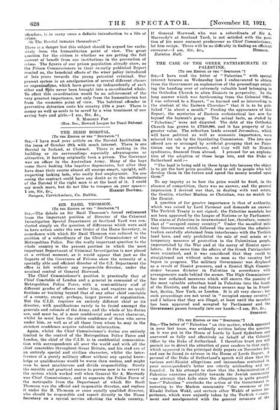THE CASE OF THE GREEK PATRIARCHATE IN PALESTINE.
[To THE EDITOR OP THE " SPECTATOR.")
have read the letter of "Palestina." with special interest because on Wednesday last I endeavoured to obtain from the Government an explanation of the proceedings entail- ing the handing over of extremely valuable land belonging to the Orthodox Church to alien Zionists in perpetuity. In the long answer which was forthcoming from the Coinnial Office I was referred to a Report, "so learned and so interesting to the student of the Eastern Churches" that it is to be pub- lished " in about a month." Pending the appearance of this Report, the mysteries of Eastern ecclesiastical law are far beyond the layman's grasp. The actual facts, as stated by " Palestina," were not disputed. The debt of the Orthodox Church has grown to £T550,000, and it has property of far greater value. The suburban lands around Jerusalem, which will have political as well as economic importance, were selected for sale by the liquidating Commission. The lots now offered are so arranged by artificial grouping that no Pales- tinian can be a purchaser, and they will fall to Zionist syndicates, financed from abroad. I pressed for an explana- tion of the adoption of these large lots, and the Duke of Sutherland said :- " The land is being sold in these large lots because the object is to get the best price possible, and to Sell to people who will develop them in the future and spend the money needed upon them."
To my inquiry as to how the price would bo fixed, in the absence of competition, there was no answer, and the general impression. I derived was that, in dealing with real estate, the Gentile, whether Moslem or Christian, was no match for the Zionist.
A question of far greater importance is that of authority, which was raised by Lord Parmoor and demands an answer. The Turkish Treaty is not signed; the Palestine mandate has not been approved by the League of Nations or by Parliament. The status of Palestine in international law, therefore, remains that of "occupied enemy country." Under the so-called mili- tary Government which followed the occupation the adminis- tration carefully abstained from interference with the Turkish land laws, and only prohibited the sale of real estate as a temporary measure of protection to the Palestinian people, impoverished by the War and at the mercy .of Zionist specu- lators. At the same time the affairs of the Greek Patriarchate were examined, and it was considered that they could be straightened out without sales so soon as the country had begun to progress. The military Government' was displaced as a result of Zionist pressure, and a Zionist High Commis- sioner became dictator in Palestine in accordance with arrangements made behind the scenes. The High Commissioner has now ordained measures which will ensure the passing of the most valuable suburban land in Palestine into the hands of the Zionists, and the real future owners may be in Frank- fort, Berlin, New York, or London. It is all very clever; but such proceedings are not usual in " occupied enemy country." and I believe that they are illegal, at least until the mandate has been approved and accepted by Parliament and the Government passes formally into our hands.—I am, Sir, &c.,
SYDENHOL






































 Previous page
Previous page